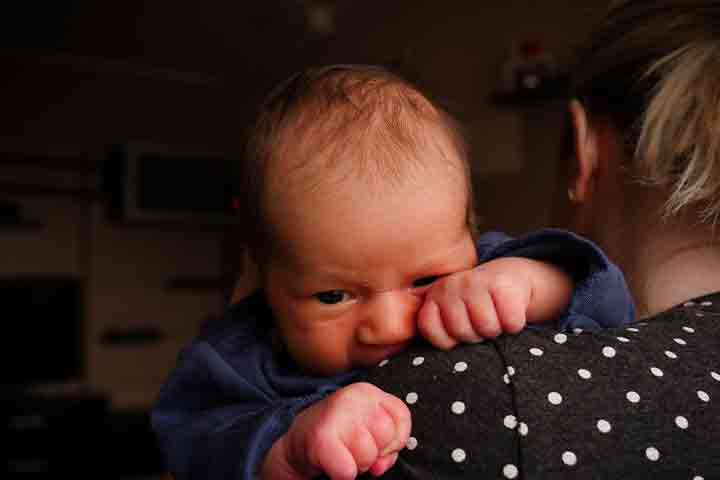A baby sleeping a lot may have ongoing growth spurts or developmental leaps. Also, a newborn might sleep more because they get accustomed to life outside the womb. Although managing a newborn’s sleep cycle is challenging in the initial days of life, it becomes easier as they recognize the difference between night and day (1). Sometimes, excessive sleeping can be due to underlying conditions.
Read on to know the amount of sleep needed for babies, how to develop a sleep schedule, and when to seek medical care for a baby sleeping a lot.
How Much Should Babies Sleep?
Typically, a baby should get 14 to 17 hours of sleep a day until four months and 12 to 15 hours until one year of age. However, an infant younger than seven months may sleep for up to 19 hours, depending on their need for rest. Nevertheless, since they have small stomachs, they usually wake up every two to three hours to be fed in the first couple of weeks (2).
The following chart displays the total hours of sleep, including naptime, suggested by the American Academy of Sleep Medicine (AASM) for children at different developmental stages.
Sleep recommendations for babies and children
Source: Healthy Sleep Habits: How Many Hours Does Your Child Need?; American Academy of Sleep Medicine (AASM)/ American Academy of Pediatrics
Why Do Babies Sleep So Much?
Sleeping promotes brain development, neural network building, and behavioral formation, and since infanthood is a period of considerable growth, babies spend most of their time sleeping or slumbering (3). However, some of the following factors could also cause newborns to sleep a lot:
- Growth spurts: An infant’s brain produces the human growth hormone (HGH) while asleep. Hence, if the baby takes frequent naps in the day and sleeps for longer at night, they may be having a growth spurt (4).
- Illness: Babies who sleep continuously, show signs of drowsiness or sluggishness, such as yawning frequently even after sleeping for hours. If these symptoms are accompanied by a lack of interest in feeding, it could be due to an underlying illness (5).
- Low blood sugar: Listless or lethargic babies who sleep longer, lack energy, and are exhausted could have low blood sugar. They may also be inattentive to sounds or sights when awake and find it difficult to wake up for feedings.
- Jaundice: Due to high bilirubin levels during jaundice, babies may become more sleepy, tired, and less interested in eating (6).
- Infection/illness: Babies have lower immunity and are more prone to infections. If the baby has a fever, cough, or skin color changes or sleeps too much and feeds less, they may have contracted an infection (7).
- Insufficient milk: If your baby takes too little or too much time to latch on, they may be getting insufficient milk. This may make them lethargic and cause them to sleep for more than four hours at a stretch (8).
- Vaccination: Vaccinations may cause mild side effects in babies, such as drowsiness and lethargy, which may last for a day or two (9).
When Should You Wake Your Baby Up For Feeding?
Newborns who regularly sleep for longer than three to four hours should be awakened to be fed. Breastfed babies need to be woken up every two to three hours, whereas bottle-fed babies can sleep comfortably for three to four hours. Ensure the baby is fed at regular intervals until they have gained enough weight, usually a few weeks post-birth. After this, they can sleep for longer intervals at night (2).
What Should You Do If Your Baby Sleeps Too Much?
If you think your newborn is sleeping for unusually long hours, rule out any medical conditions by noting whether they feed eight to 12 times and have at least six wet and three dirty diapers a day. Additionally, observe breathing difficulties, low weight, fussiness when awake, pale skin, and vomiting after feeding. In such cases, consult your pediatrician.
However, if your baby appears lethargic and does not show other signs of distress, it could be because they are underfed or unable to have a deep and peaceful sleep. The following tips may help resolve this (10):
- When they are awake, feed them every one to two hours, and when they show signs of hunger. Crying might indicate delayed feeding.
- When the baby is being fed, make sure they are fully awake and not nodding off to sleep.
- A comfortable temperature aids sleep, so keep the room cool and dark—neither too cold nor warm.
- Record the number of hours the baby has slept for a clearer picture of their sleeping pattern.
How Do You Develop A Proper Sleep Schedule?
Here are some ways to inculcate good sleeping habits (11):
- Ensure the baby is well fed before going to sleep. Underfed babies may sleep excessively due to a lack of energy.
- Place the child in bed when they are sleepy but not yet asleep. It helps them learn to fall asleep on their own.
- Ensure the baby sleeps on their back for sufficient oxygen supply and to aid digestion.
- Follow a nighttime routine to help the baby understand it is time to sleep.
- Create a sleep schedule and follow it regularly to help the baby fall into a sleep pattern.
- Give them a pacifier during bedtime to reduce restlessness and repeated awakening, but avoid letting them sleep with a bottle, which increases the risk of cavities and choking.
When Should You See A Doctor?
Consider consulting your pediatrician if you notice the following issues with your baby (10) (11):
- Inability to adjust to a sleep pattern even after following good sleeping habits
- Loud snoring or long pauses while breathing when asleep
- Fever or other signs of illness
- Extreme fussiness or irritability that is difficult to soothe
- Fatigue
Babies usually sleep around 12 to 15 hours a day until they reach one year. This could be due to several reasons, including growth spurts, lack of sufficient milk, low blood sugar, and in some cases, an underlying health condition such as jaundice. If your baby shows signs such as loud snoring, fever, or irritability while trying to soothe, have a talk with their pediatrician to get timely and appropriate treatment. It is advised for parents that they try and maintain a proper sleep schedule for their babies to reduce the chances of any sleep-related issues.
Key Pointers
- Babies should get around 12–16 hours of sleep per day until they are around a year old.
- Growth spurts, low blood sugar levels, or ceratin infection/illness may cause the baby to sleep for extended hours.
- Placing the child in the bed and on their back when sleepy and not fully asleep, feeding them well before sleep time, and other tips to help develop a proper sleep schedule are given below.
Learn important information about baby sleep patterns and how much sleep your baby should get.















